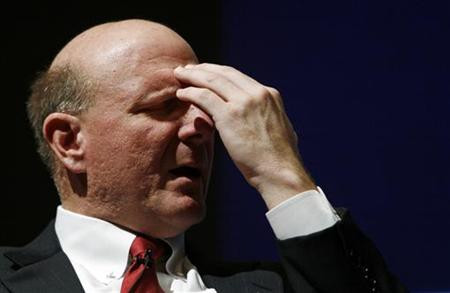Apple and Google Dominate: Microsoft CEO Steve Ballmer's Three Biggest Screw-Ups

Analysts have highlighted three key "screw-ups" under CEO Steve Ballmer's watch as pivotal moments that led to Apple and Google's current dominance of markets most expected to be held by Microsoft.
The Skype Deal
Microsoft Corp. confirmed 13 Oct. that its drawn out acquisition of Skype had finally drawn to a close. The company reported that it had "closed its acquisition of Skype Global," paying $8.5 billion (£5.4 billion) in the process.
Microsoft's decision to buy Skype came under widespread scrutiny in May just after the deal was announced. Following the Ballmer led deal's announcement the service suffered a series of severe crashes, leading many to question the inflated $8.5 billion (£5.4 billion) price-tag.
Doubts peaked after influential hedge fund manager David Einhorn called for Ballmer's dismissal following the outages.
Einhorn's words hold significant weight in the world of business. The hedge fund manager was among the first to foresee Lehman Brothers Holdings Inc's weakened state before the investment bank's collapse. Since his successful prediction, he has become something of a soothsayer in the world of business.
Einhorn's public questioning of Ballmer's leadership, led to widespread speculation regarding the CEO's future at Microsoft. The rumours only later subsided when Microsoft issued an official statement clarifying Ballmer's position was not in question.
Bing
Ballmer's mishandling of Microsoft's Bing search engine has also been credited as one of the company's worst mistakes in recent memory.
In the last financial quarter despite an overall increase in Microsoft's revenue and profit, the company's Online Services division -- which houses its flagship Bing search engine -- saw its ongoing loss deepen losing $728 million on revenues of just $662 million.
Despite the loss, speaking at the Web 2.0 Summit, Ballmer maintained the search engine would succeed. Ballmer suggested Bing had grown to account for 15 per cent of the search market -- it only accounted for 7 per cent when first launched in 2009.
Windows Phone
The ongoing failure of Microsoft's Windows Phone OS has also been credited as once of the company's biggest short-comings in recent memory.
During Ballmer's reign the company has pushed the OS harder than ever investing vast amounts of both time and money. Despite Microsoft's efforts, external market analysts have uniformly reported at best a minor growth in the OS' market share.
Most recently, a report from research group Gartner, released just before Mango's announcement, revealed just how badly the Windows Phone OS had been doing.
According to the research, not only was the OS yet to account for even 10 per cent of the smartphone market, but since the launch of Windows Phone 7, Microsoft's share of the smartphone market had actually dropped.
The report highlighted how since the release of the OS's Windows 7 version, by the end of Q1 2011 the OS's share of the market had fallen from 6.8 to 3.6 per cent.
Even with the researcher's pessimistic take on Windows Phone's future, in a recent speech Ballmer not only reiterated his belief that the OS would succeed, but that its only real competitor was Apple's iOS 5.
© Copyright IBTimes 2025. All rights reserved.





















